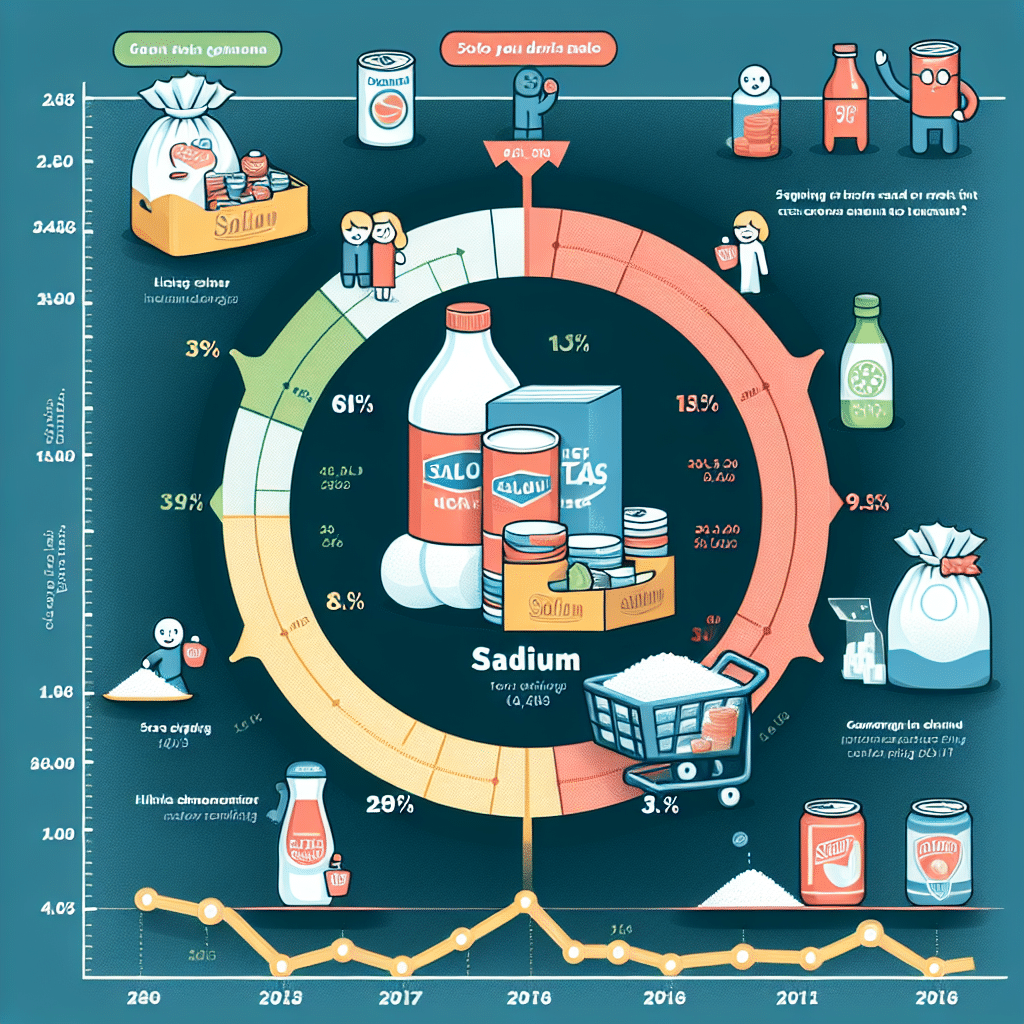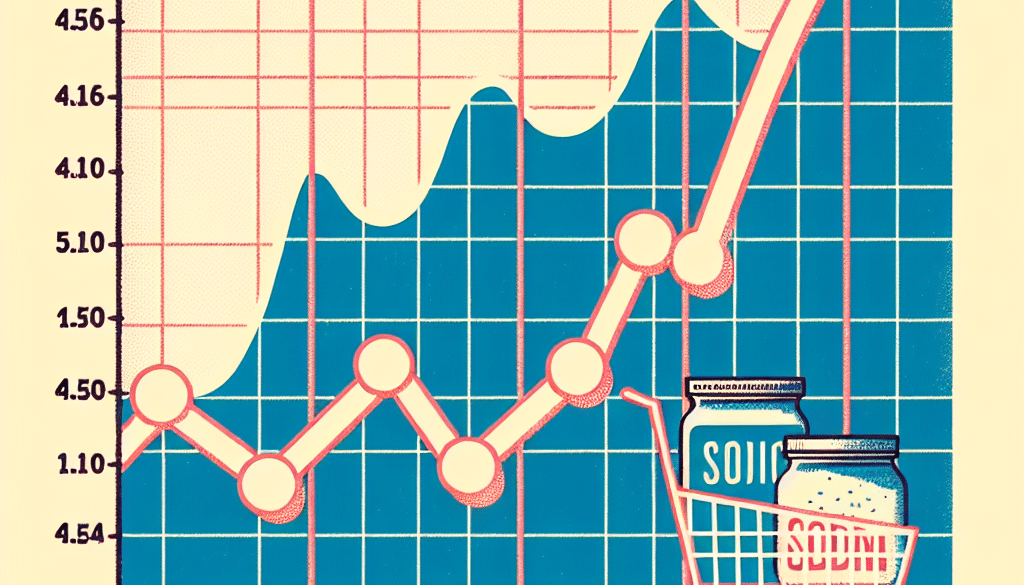Have Consumers Changed How Much Sodium They Purchase?
-
Table of Contents
- Sodium Consumption Trends: How Purchasing Habits Have Shifted
- The Impact of Sodium on Health
- Consumer Awareness and Education
- Changes in Purchasing Habits
- Case Studies and Statistics
- Industry Response to Consumer Demand
- Challenges and Limitations
- Conclusion: Key Takeaways on Sodium Purchasing Habits
- ETChem: Your Partner for High-Quality Protein Products
Sodium Consumption Trends: How Purchasing Habits Have Shifted

In recent years, there has been a growing awareness of the health implications associated with high sodium intake. This awareness has prompted consumers to reconsider their dietary choices, including how much sodium they purchase. This article delves into the changing trends in sodium consumption, examining whether consumers have indeed altered their purchasing habits in response to health recommendations and increased knowledge about the risks of excessive sodium intake.
The Impact of Sodium on Health
Before we explore the changes in consumer behavior, it’s crucial to understand why sodium is a concern. Sodium, primarily consumed as salt (sodium chloride), is essential for bodily functions, but excessive intake can lead to hypertension, heart disease, stroke, and kidney damage. Health organizations worldwide recommend limiting sodium intake to reduce these risks.
Consumer Awareness and Education
Increased public health campaigns and labeling initiatives have heightened consumer awareness about the dangers of high sodium intake. This has led to a more informed public that is actively seeking lower-sodium options.
- Labeling laws have made it easier for consumers to identify high-sodium products.
- Health campaigns have emphasized the importance of reducing sodium intake.
- Education about reading nutrition facts and ingredient lists has empowered consumers to make healthier choices.
Changes in Purchasing Habits
Research indicates that there has been a shift in consumer purchasing habits regarding sodium. A study by the Centers for Disease Control and Prevention (CDC) found that between 2000 and 2014, there was a significant decrease in the purchase of foods with high sodium content. Other studies have shown similar trends, with consumers increasingly opting for fresh and unprocessed foods over canned or pre-packaged items that tend to be high in sodium.
Case Studies and Statistics
Several case studies highlight the shift in consumer behavior. For instance, a market analysis revealed that sales of low-sodium products have been on the rise, while those of traditional high-sodium items have stagnated or declined. Additionally, food manufacturers have reported an increase in demand for reduced-sodium versions of popular products.
- Market research data shows a growing market for low-sodium products.
- Food companies are reformulating products to meet consumer demand for less sodium.
- Restaurants and fast-food chains are offering more low-sodium menu options.
Industry Response to Consumer Demand
The food industry has responded to the shift in consumer preferences by reformulating products to contain less sodium. This includes not only the introduction of low-sodium alternatives but also a gradual reduction of sodium levels in existing products to help consumers adapt their taste preferences.
- Food manufacturers are reducing sodium content in stages to avoid a noticeable change in taste.
- New product development is increasingly focused on low-sodium options.
- Some companies have set internal targets for sodium reduction across their product lines.
Challenges and Limitations
Despite the positive trends, there are challenges to reducing sodium consumption. Many consumers remain unaware of the sodium content in restaurant meals and certain food categories. Additionally, taste preferences and habits can be difficult to change, and low-sodium products sometimes face criticism for lacking flavor.
- Consumer education is still needed to address hidden sources of sodium.
- There is a need for continued innovation to improve the taste of low-sodium products.
- Price and availability can limit access to healthier low-sodium options.
Conclusion: Key Takeaways on Sodium Purchasing Habits
In conclusion, there is evidence to suggest that consumers have indeed changed how much sodium they purchase. Driven by increased awareness and the availability of healthier options, many are actively seeking to reduce their sodium intake. While challenges remain, the trend towards lower sodium consumption is a positive sign for public health. As consumer preferences continue to evolve, it is likely that we will see further innovation and adaptation in the food industry to meet the demand for low-sodium products.
ETChem: Your Partner for High-Quality Protein Products
As consumers continue to prioritize health and wellness, the demand for high-quality protein products is on the rise. ETChem is at the forefront of this trend, offering a wide range of collagen products that cater to the health-conscious consumer. Whether you’re looking for marine, fish, bovine, or chicken collagen, ETChem has the right solution for your dietary supplement, food and beverage, or cosmeceutical needs.
With a commitment to quality and customer satisfaction, ETChem is the ideal partner for businesses looking to expand their product offerings with protein-rich, health-promoting ingredients. Contact ETChem today to discover how their collagen products can enhance your brand and meet the evolving demands of today’s health-focused market.
About ETChem:
ETChem, a reputable Chinese Collagen factory manufacturer and supplier, is renowned for producing, stocking, exporting, and delivering the highest quality collagens. They include marine collagen, fish collagen, bovine collagen, chicken collagen, type I collagen, type II collagen and type III collagen etc. Their offerings, characterized by a neutral taste, instant solubility attributes, cater to a diverse range of industries. They serve nutraceutical, pharmaceutical, cosmeceutical, veterinary, as well as food and beverage finished product distributors, traders, and manufacturers across Europe, USA, Canada, Australia, Thailand, Japan, Korea, Brazil, and Chile, among others.
ETChem specialization includes exporting and delivering tailor-made collagen powder and finished collagen nutritional supplements. Their extensive product range covers sectors like Food and Beverage, Sports Nutrition, Weight Management, Dietary Supplements, Health and Wellness Products, ensuring comprehensive solutions to meet all your protein needs.
As a trusted company by leading global food and beverage brands and Fortune 500 companies, ETChem reinforces China’s reputation in the global arena. For more information or to sample their products, please contact them and email karen(at)et-chem.com today.




